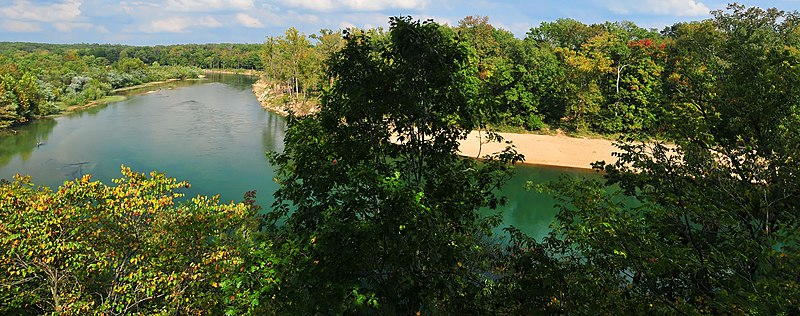

B. Protest from coast to coast
West Coast : Le Summer of Love (été 1967), point d’orgue du mouvement hippie.
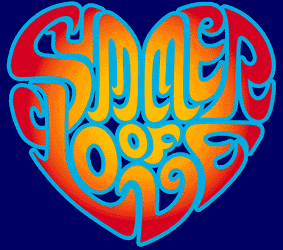
Le mouvement, d’abord très marginal, enfle rapidement et a pour épicentre la côte ouest des Etats-Unis, notamment le quartier d’Aight Ashbury de San Francisco (vite surnommé Hashbury). Courant 1967, des milliers de jeunes convergent vers le quartier. Des jeunes qui fuient leurs maisons, leurs parents et les valeurs de ces derniers, qu’ils jugent étriquées. Ils vivent en communautés, se rassemblent par milliers dans les parcs.
Ces hippies arborent des tenues bariolées, cheveux longs flottants au vent. Ils se rassemblent par dizaine de milliers dans des Human Be-in, de grands rassemblements festifs et musicaux dans lesquels ils peuvent s’adonner à leurs passions (méditation, amour libre, écologisme, pacifisme, consommation de substances hallucinogènes). Tous entendent libérer leurs esprits des contraintes matérielles qui les étouffent.
Durant tout l'été 1967, lors de grands rassemblements, les jeunes vivent au rythme de la devise “sex, drugs and rock'n'roll”. Très vite, la situation se gâte, le quartier n'attire plus seulement les hippies, mais aussi des touristes qui photographient cette faune hirsute. Certains repèrent vite le bon filon et récupèrent ce mouvement hostile au capitalisme triomphant. D’ailleurs en octobre, les hippies organisent l’enterrement du mouvement sur les hauteurs de San Francisco.
Source : Bricabraque
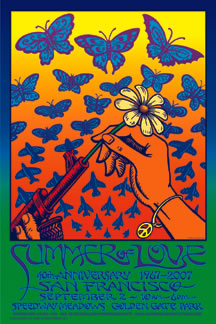
Affiche commémorative du Summer of Love de 1967
Source : 2be1 Records
Animation Arte sur le SOL : Arte Sol


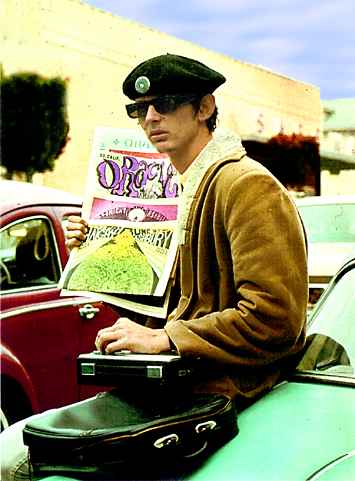
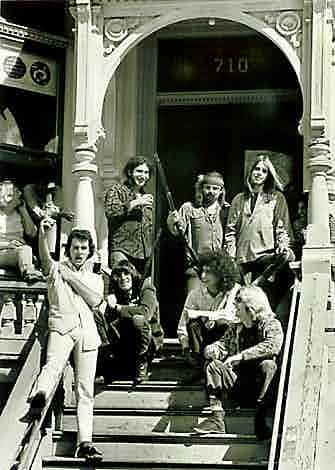


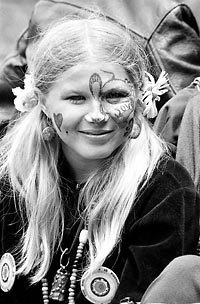
Obituary of Scott McKenzie
|
Obituary of Scott McKenzie San Francisco Chronicle, Monday, August 20, 2012
McKenzie with the Mamas and the Papas Scott McKenzie, the Los Angeles singer who performed the divisive Summer of Love hit "San Francisco (Be Sure to Wear Flowers in Your Hair)," died at his home in Los Angeles Saturday after a long battle with Guillain-Barré syndrome, a disease that affects the nervous system. He was 73. Upon hearing Mr. McKenzie perform "San Francisco" at the Monterey International Pop Music Festival in 1967 with the Mamas and the Papas, who headlined over Jimi Hendrix, Joe McDonald of Country Joe and the Fish reportedly remarked, "We've been had." Even though it became one of the most famous songs about San Francisco, many locals dismissed it as a slick pop imagining of the Haight-Ashbury scene with no real connection to the events taking place there, particularly in the lyrics: "For those who come to San Francisco / Summertime will be a love-in there / In the streets of San Francisco / Gentle people with flowers in their hair." "The song was created by Hollywood hippies who were not a part of what they were writing about, and they got it wrong," said Joel Selvin, former San Francisco Chronicle pop music critic and author of the books Monterey Pop and Summer of Love. "In San Francisco, the song was treated with a range from scorn to ridicule." George Harrison's take Beatles guitarist George Harrison was also disappointed the Haight-Ashbury scene didn't live up to the picture painted in the song. "I went there expecting it to be a brilliant place, with groovy gypsy people making works of art and paintings and carvings in little workshops," he said in "The Beatles Anthology." "But it was full of horrible spotty drop-out kids on drugs, and it turned me right off the whole scene." John Phillips, the leader of the Mamas and the Papas, wrote the song, which reached the No. 4 spot on the Billboard Hot 100 and topped the charts in Britain and most of Europe in 1967. Released by Los Angeles record executive and producer Lou Adler as a way to promote the festival, the song featured several top-tier Southern California session musicians, including bassist Joe Osborn, keyboardist Larry Knechtel and drummer Hal Blaine. The Monterey Pop Festival proved a watershed moment for rock music, where maverick artists such as Jefferson Airplane, Otis Redding and the Who triumphed over refined chart acts such as the Association, the Byrds and Mr. McKenzie, who released two solo albums but never scored another solo hit. Born Philip Blondheim in Jacksonville, Fla., and raised in North Carolina and Virginia, Mr. McKenzie met Phillips in high school. They played in several outfits together, including the vocal group the Singing Strings and the folk-rock act the Journeymen. Mr. McKenzie turned down an invitation to join the Mamas and the Papas, opting to pursue a solo career. When his career failed to ignite after the success of "San Francisco," the singer quit the music business in the early '70s, settling in Joshua Tree (San Bernardino County) and later Virginia Beach, Va. Returning to music He returned in the '80s to perform with a touring version of the Mamas and the Papas, filling in for Phillips and Denny Doherty. In 1988, Mr. McKenzie co-wrote "Kokomo," a No. 1 hit for the Beach Boys. "San Francisco" has appeared in numerous films and served as an anthem for counterculture movements. In 2002, Mr. McKenzie performed it at the Vietnam Veterans Memorial in Washington. Mr. McKenzie had no surviving family members. Aidin Vaziri is The San Francisco Chronicle's pop music critic. E-mail: avaziri@sfchronicle.com Twitter: @MusicSF |
Source : SFGate

Carte de Californie
Source : Dreamstime